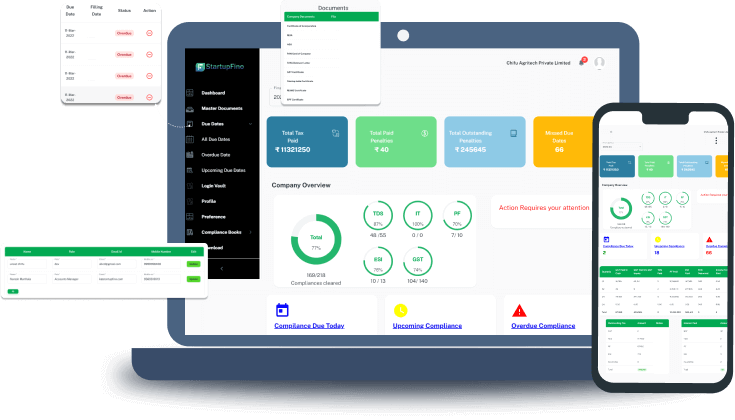Mumbai, the financial hub of India, offers a wide range of financial reporting services to cater to the needs of businesses. These services encompass financial statement preparation, audit support, compliance with regulatory requirements, and advisory services. Renowned accounting firms and professional service providers in Mumbai offer expertise in areas such as financial analysis, tax planning, risk management, and financial forecasting.
With a dynamic business environment and a skilled workforce, Mumbai's financial reporting services assist organizations in maintaining transparency, ensuring accurate financial records, and meeting reporting obligations while optimizing their financial performance. At Startupfino we have financial consultants which help and focus on financial reporting and compliance.
Key aspects of Financial Reporting Services in Mumbai
Financial Statement Preparation: The service providers assist the business in preparing the financial statements, including the income statement, cash flow statement, and the balance sheet. It is to ensure that these statements reflect the financial position and performance of the company accurately.
Data Analysis and Interpretation: Financial reporting services involve analyzing financial data to identify patterns, trends, and key insights. It helps companies to understand the financial performance, identify areas for improvement, and then make informed business decisions accordingly.
Internal Controls and Risk Assessment: Service providers assess internal controls within the company to ensure the reliability and integrity of financial information. It is to identify potential risks, recommend control measures, and provide guidance on maintaining effective internal controls.
Regulatory Compliance: Financial reporting services assist company in meeting regulatory requirements set by government authorities, industry regulators, and stock exchanges. It includes the preparation of financial reports and disclosures as per the regulatory guidelines.
Auditing Support: Financial reporting services can also collaborate with auditors during the auditing sessions. It is to assist in providing necessary documentation, explanations, and supporting schedules to facilitate the audit and address any audit-related queries.
Financial Reporting Systems Implementation: Service providers may assist companies in implementing or improving financial reporting systems, such as specialized financial reporting tools or enterprise resource planning (ERP) software. They help streamline financial reporting processes and enhance data accuracy and efficiency.
Common Inclusions under Financial Reporting Services
There are few important inclusions under financial reporting services in Mumbai are as mentioned below:
General Ledger Accounting
We always verify that each punched account entry is accurate. In the end, it produces a productive accounting process. Processing payroll journals, ledger accounting, ledger reconciliations, maintaining disposal and depreciation journals, processing adjustment journals and stock movement, period-end book closing, processing purchase, lease, dividend, and loan journals for mergers and acquisitions, and general information about adjustments made for ledger journal entries, including adjustments related to accruals and prepayments, are some of our main general ledger accounting services.
Accounts reconciliation services
We ensure that the bank statements accurately reflect the internal bookkeeping and accounting data. Doing this makes the chance of errors in managerial, financial, and accounting reports low. Our accounts reconciliation solution will also accurately give you a clear view of the financial health of your business. Just a few of the numerous account reconciliation services we provide include full cheque sequencing, accounts payable and receivable reconciliation, balance sheet account reconciliation for a clear understanding of assets and liabilities, credit card reconciliation, general ledger maintenance, precise bank reconciliation services, clean report generation, a flexible period for proper management of reconciliations, and customised account reconciliation.
Services for Cash Flow Management
We help close the current cash flow gaps by providing services for cash flow management. Your company's financial planning is aided by the procedure's creation of estimations and completion of budget predictions. By employing adequate bookkeeping, you may control the financial flows of your business thoroughly and properly. Understanding your company's financial status is crucial.
Trial Balance Setup
We help your company create a trial balance at the end of every reporting period. Its main goal is to ensure that all of the data and calculations used in your company's bookkeeping system are accurate.
Management and Recovery of Revenue
Our highly skilled accounting specialists make finding missing or erroneous documents easier. Additionally, they aid in the prompt resolution of any issues. That could aid in the issue of late payments. You can utilise our outbound contact centre services to speed up the settlement of your company's accounts receivable. Additionally, you may improve your company's return on investment with the help of our effective revenue management and recovery system.
Statement of retained earnings
Similar to the report type before it, the statement of retained earnings shows the company's total profit after net income is added in and dividends are paid to shareholders. It shows the profits a company made during the observation period. It helps business owners and decision-makers analyse the organisation's financial health and evaluate potential future reinvestments or expansions based on the retained earnings available for the upcoming accounting period.
ESG Reporting
ESG reports stand for environmental, social, and governance reporting. This reporting style has become more common due to increased attention from regulators, public expectations, and investors on how businesses affect the environment and pressure on them to be open about the effects of their operations and activities on the climate. Due to the rising interest in ESG variables as indicators of a company's long-term performance, investors and other significant stakeholders now demand that they be disclosed in a company's financial statements.
Types of Financial Reporting in Mumbai
There are several types of financial reporting that serve different purposes and cater to the information needs of various stakeholders. Here are some common types of financial reporting:
External Financial Reporting
External Financial Reporting includes the preparation and dissemination of financial statements, including the balance sheet, income statement, cash flow statement, and statement of changes in equity, along with accompanying notes and disclosures.
Annual Financial Reports
Annual financial reports include financial statements, management discussion and analysis (MD&A), notes to financial statements, and other relevant information required by accounting standards or regulatory authorities.
Interim Financial Reporting
Interim reports provide an update on the organization's financial performance and position between the annual reports, enabling stakeholders to assess the company's progress and make informed decisions.
Management Reporting
Management reporting includes various management reports, performance dashboards, key performance indicators (KPIs), and other financial analysis tools used by management to monitor the organization's performance, identify trends, and make strategic decisions.
Regulatory Financial Reporting
Regulatory Financial reports involve complying with specific reporting requirements imposed by regulatory authorities or industry-specific regulations. Examples include financial reports submitted to securities commissions, banking regulators, or insurance regulators.
Sustainability Reporting
Sustainability reporting provides information about the organization's efforts and impacts concerning sustainability, corporate social responsibility, climate change, diversity, and other ESG-related matters.
Segment Reporting
Segment reporting provides insights into the financial performance and risks associated with individual business segments, allowing stakeholders to assess the profitability and contribution of each segment to the organization as a whole.
Important Financial Statements
The main forms of financial statements that can be included in a financial report are as follows. The significance of each statement and its advantage are explained in the following information.
Income Statement
It is also commonly referred as a profit and loss statement. The income statement is a financial analysis document that highlights the revenue, expenses, gains, and losses of a company over a specified period. This statement's major objective is to determine whether the company is profitable. It accomplishes this by compiling a list of the major sales activities, production costs, and any other operational costs for a certain accounting period. The report calculates the business's profit (or loss) by deducting all costs from revenue.
Balance Sheet
An company’s balance sheet thoroughly breaks down its assets, liabilities, and stockholders' equity. In essence, a balance sheet can be used for internal or external purposes which summarises the company's financial health at a specific point, which is often a monthly or quarterly period. The balance sheet can be used externally by anyone considering investing in the business because the document offers helpful details regarding the resources that are accessible and how they were financed. On the one hand, it can be examined internally by any interested party to determine whether the business is moving in the right direction, such as management or employees.
Cash Flow Statement
A cash flow statement (CFS) reveals how much money enters and leaves a company. The CFS provides stakeholders with information on how a company manages cash to settle debt, pay for current expenses, and finance current and future investments. It is essential to the effective administration of a firm and contains components of both the income statement and the balance sheet. A cash flow statement is often split into three sections that group all the cash received and spent. The operating cash flow, which displays sales, costs, gains, and losses, is presented first. The investment cash flow, which displays sales and purchases of debt and stock, follows. The financial one provides information on long-term obligations like loan payments and equity assets like the sales of company stock.
Benefits of Financial Reporting
For any company, financial reporting is essential. It entails gathering, examining, summarisation, and presenting information on a company's financial standing. The following advantages are available to your organisation when financial reporting services are outsourced to a professional:
Transparency and Accountability
Financial reporting promotes transparency by providing stakeholders with a clear and accurate view of an organization's financial performance, position, and cash flows.
Informed Decision-Making
Financial reports provide valuable information for stakeholders to make informed decisions. Investors use financial reports to evaluate the financial viability and growth potential of a company before making investment decisions.
Cash flow
A company's cash flow is essential to its long-term financial health, no matter how big or small. You may maintain the security and fluidity of your financial operations by delving deeply into cash flow with regard to predicted earnings and liabilities using a mix of specialised metrics and key performance indicators.
Access to Capital
Financial reporting plays a crucial role in attracting investment and accessing capital. Accurate and reliable financial reports enhance investor confidence and make it helpful for companies to raise capital through equity offerings or debt financing.
Better debt management
Even though there may be many different types of financial reporting depending on the purpose or programme, almost all solutions will help you track the current assets divided by the current liabilities on the balance sheet to help analyse your liquidity and manage the debts appropriately.
Identification of Trend
The ability to recognise historical and current trends can help you handle any possible problems and make modifications that will improve the general health of your business, regardless of the type of financial activity you want to track.
Communication and data access
Every modern financial report worth its size is available on a wide range of devices and adapted for each one. Unrestricted access to critical financial information will help you resolve problems swiftly and improve internal communication inside the company.
Liabilities
Liabilities that must be managed include supplier credit, business loans, credit cards, and credit lines. Consider that you want to apply for a loan for business expansion. In that scenario, before making an official application, you can use a financial report template to review financial facts and determine whether you need to reduce current obligations.
What Elements Should a Successful Financial Reporting System Contain?
This in-depth study on the subject will cover key elements that a solid financial reporting system should include. The processes used in the past to create these reports were quite different from those used today since the tools and methods used were static. In contrast to the time-consuming, labour-intensive process of the past, reports are now produced utilizing real-time data, enabling businesses to make crucial decisions immediately. After making that point, we will go through a few crucial elements for success in the modern corporate climate.
Real-time information
As previously said, real-time information is one of the crucial elements of excellent financial reporting. You must be able to track every detail of of the financial performance as soon as it occurs in order to make strategic decisions that will result in success and significantly lower risks. You can spend resources wisely based on current trends or limit costs that are not going as expected and could have negative implications in the future.
Predictive analytics
Another element that has become important for businesses to maximize the value of the financial data is predictive analytics. It helps businesses forecast various operations and enhance them, such as identifying potential loss drivers or estimating future product demand. Using a combination of the historical and current data, this technology allows you to extract patterns and trends from financial data in order to make precise predictions about future performance.
Automation
The generation of financial reports using traditional methods requires countless hours of labour-intensive manual data collection, organizing, and analysis. As a result, the procedure was far less successful because the data it included might not be relevant once a report was finished. As a result, financial reporting must now be automated. The ability to automatically generate reports using live data allows decision-makers to focus on other important tasks while still having enough time, considerably reducing the possibility of human error when a report is manually generated.
Accessibility and cooperation
Accessibility and cooperation are essential for a firm to achieve its financial goals. That requires the involvement of all relevant departments and stakeholders. The accessibility and level of cooperation provided by modern financial analytics software make this possible. Due to interactive data visualisations, the data in reports is easily understandable for non-technical users, and they can be instantly disseminated in a number of forms to assist meetings and debates.
Why to choose Startupfino for Financial Reporting Services?
For any business trying to acquire a competitive advantage, Startupfino provides accurate financial reporting and analysis. Here are some justifications for choosing us if you need financial reporting and analysis services in India:
Relevant Reports: When making decisions, you should consider the data's applicability. We deliver meaningful weekly, monthly, and quarterly reports by following the correct accounting methods.
Simple to Follow: Financial reports offer key responses for stakeholders in order to give you an accurate view of strategic decisions, improve operational metrics, and speed up decision-making.
Meet your goals: Your financial reports should assist you in developing a plan to reach your business objectives. Together, we look at your company's data to uncover important information.
Ideal Techniques: Financial reports must be produced with the help of ideal accounting procedures. We provide reports by utilising the best accounting practices, standards, guidelines, and credible information sources.
Modern Technology: Modern technologies have completely transformed the financial report creation method. We use a range of technologies, such as business intelligence, predictive analytics, and data analytics, to create strategic reports and offer insights.































































